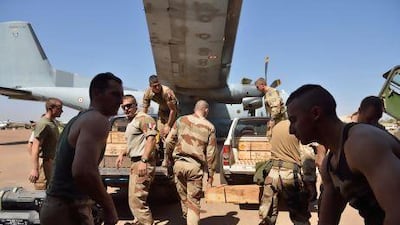BAMAKO // As French forces continue to step up their presence in Mali, with more men and munitions arriving and air strikes continuing over the north, France's leaders have offered assurances that they will leave only when the country is safe, free from terrorism and a democracy.
But experts and northerners in the capital yesterday warned that in a country with a precarious government, led by a military junta with a newly appointed prime minister and feeble president, and an ill-equipped army, the goals of political stability and security for Mali could be a long way off.
Aziz Cessi is a pastor, one of Mali's tiny Christian minority, who said he had never had a problem with his Muslim friends in the northern city of Gao. But on March 31 last when Tuareg independence fighters, swiftly followed by jihadi groups, roared into town and routed the soldiers in eight short hours, he knew he would have to leave.
Islamic law was swiftly imposed and several churches were attacked. Now, Mr Cessi lives in a Roman Catholic-run camp outside the capital and said that this week, when the jihadi groups hastily fled Gao under bombardment, there was unbounded happiness among residents. His friends told him that people formed joyful gatherings, women took off the black garments imposed on them and people again began smoking, playing football and listening to music in the streets.
He hopes to return soon with his family. "I miss the sand dunes," he said. "I miss the fishing trips with my friends."
But like others from the vast, sparsely populated northern areas, Mr Cessi holds the central government responsible for the collapse of security there. He said that the city was safe, but it was well known that extremist groups linked to Al Qaeda had long operated in the northern deserts.
"There was a neglect, a laxness from the authorities," he said. "At the time, many countries advised the authorities to be really careful about the Islamists in the desert, but the authorities closed their ears."
Abdoulaye Niang, a retired UN development expert who now runs a strategic studies group in Bamako, said he thinks the French erred by entering the Mali conflict. He drew parallels with Afghanistan, where an international coalition sought to oust the Taliban with a fierce air campaign, but found themselves drawn into a seemingly unwinnable guerrilla war which has lasted more than a decade.
"The case of Mali will be tricky," he said.
Mr Niang agreed with some European experts that the decision by the French was based not only on a push into the south by the groups which have controlled the vast north for more than eight months, but also indications in Bamako last week that supporters of last year's military coup were seeking to overthrow President Dioncounda Traore.
If this happened, the ensuing power vacuum would make it even more difficult for Malian authorities to hold territory, let alone address problems with a collapsing economy and dwindling food supplies.
The presence of French soldiers in the capital, strategically positioned at the airport and other places, has proved reassuring, but Mr Niang said that such a weak government would be unable to secure the north.
"I think France overreacted to the indicators," he said, pointing out that the groups who control the north include fighters who gained experience in guerrilla wars in Iraq and Afghanistan.
The Malian army, he added, probably numbered fewer than 5,000 and certainly not more than 8,000 fighters. Loyalties were split and defections rife after the military coup last year. Despite training programmes conducted by France, Germany, the US and other countries, they are not an effective fighting force. He said they were underfunded, under-equipped and had always focused on securing cities rather than Mali's vast desert areas where rebel forces lurk.
Hopes that West African forces could bolster the security effort also seem faint. Although several countries in the Economic Union of West African States have promised to send hundreds of troops, one western official in Bamako said that, so far, only officers had arrived to make plans.
A planned European Union training programme for Malian troops will likely be accelerated but it is unclear how effective it will be if the troops to be trained are already on the front line of a conflict that will need ground forces to sustain its gains.
For the moment, the 18 displaced families at the church-run camp in Bamako are watching and waiting, but not yet planning to return home.
"Since the French came, people at home are so happy," said Lucie Koné, 20, who lives just outside Timbuktu. "I hope to go home, since France is there, and help is given. Life here is unusual for us."
twitter: For breaking news from the Gulf, the Middle East and around the globe follow The National World. Follow us

